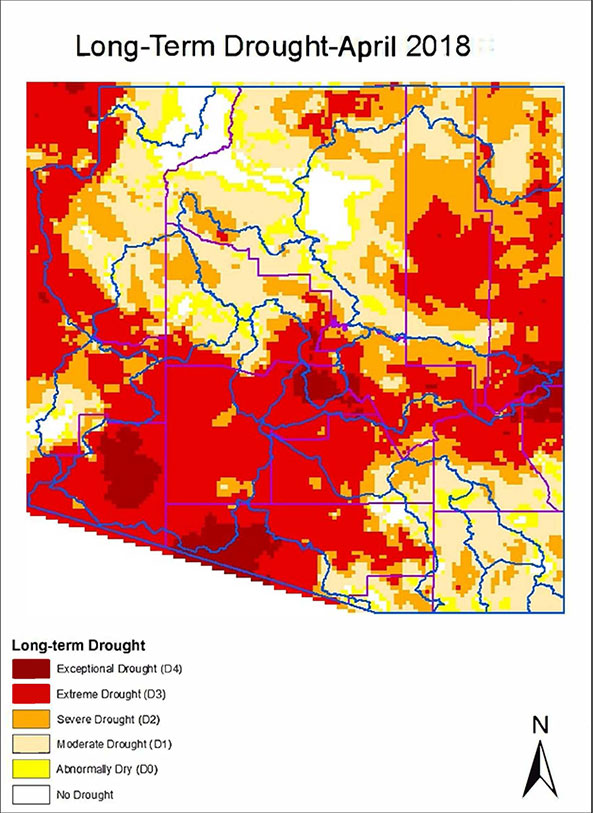A Drought Emergency Declaration remains in effect for the state of Arizona as signed by the governor in accordance with the Arizona Drought Preparedness Plan.
The continuation of this Drought Emergency has been recommended by the Drought Interagency Coordinating Group in their bi-annual meeting on May 29, 2018.
Over the past several weeks, showers and thunderstorms have become more widespread across the region yielding locally generous rainfall for many locations. Northern Arizona has been the beneficiary of the heaviest rains resulting in localized flooding and some relief from drought conditions. However as is typical with summer thunderstorms, rainfall coverage has not been uniform and not all aspects of drought impacts are alleviated by these brief, heavy rains.
In addition, precipitation deficits and impacts from drought have been so extreme since last year, this beneficial rain has only started the drought relief process. As a result, extreme and exceptional drought conditions have persisted over much of the area with only modest improvements where the heaviest rainfall has occurred. A continuation of frequent, widespread rain will be necessary the remainder of the summer for more expansive improvement in drought conditions.
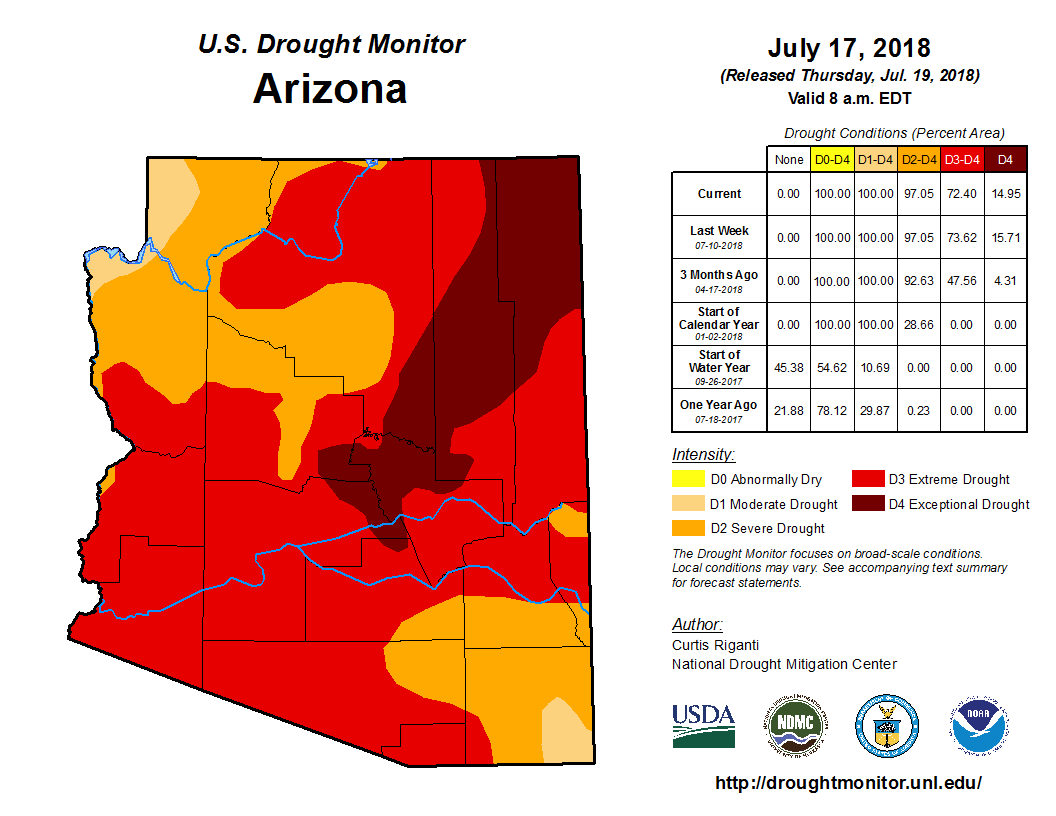 Local Area Affected:
Local Area Affected:
The National Drought Monitor depicts only minor improvement to drought conditions in the past month. Extreme and Exceptional drought conditions continue to persist over a large part of Arizona. Severe drought conditions exist much of the remainder Arizona, except the far northwest and southeast parts of the state where Moderate drought conditions exist. Extreme drought remains in parts of far southeast California with Severe drought holding firm through the rest of the southeast California deserts.
Exceptional Drought (D4) - across parts of central Arizona
In Arizona: far eastern Maricopa and part of Gila counties
Extreme Drought (D3) - across much of central, southern, and western Arizona, as well as Southeast California
In Arizona: Maricopa, northern Pinal, southern Gila, La Paz, and Yuma counties
_________________________________________________________________________
_________________________________________________________________________
Precipitation/Temperature Outlooks:
The 8-14 day temperature outlook for July 28-Aug 3 period calls for much better chances of above average temperatures and a very slight chance of above average rainfall. The 30 day outlook for August 2018 (not shown) indicates only a modest chance for above average temperatures and above average precipitation. The 90 day outlook for the period August through October 2018 indicates better chances for above average temperatures and enhanced odds of above average precipitation.
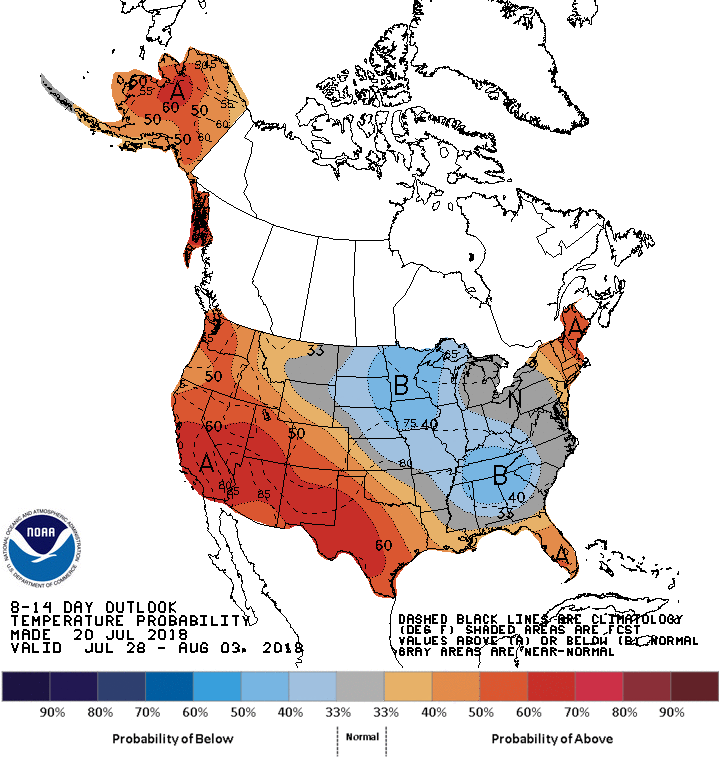
__________________________________________________________________________
The continuation of this Drought Emergency has been recommended by the Drought Interagency Coordinating Group in their bi-annual meeting on May 29, 2018.
Extreme Drought here in Maricopa County
ONLY MODEST IMPROVEMENTS TO DROUGHT CONDITIONS
AS THE MONSOON BEGINS IN EARNEST
Updated on Sunday, July 22, 2018 - Mark O'Malley
Summary:Updated on Sunday, July 22, 2018 - Mark O'Malley
Over the past several weeks, showers and thunderstorms have become more widespread across the region yielding locally generous rainfall for many locations. Northern Arizona has been the beneficiary of the heaviest rains resulting in localized flooding and some relief from drought conditions. However as is typical with summer thunderstorms, rainfall coverage has not been uniform and not all aspects of drought impacts are alleviated by these brief, heavy rains.
In addition, precipitation deficits and impacts from drought have been so extreme since last year, this beneficial rain has only started the drought relief process. As a result, extreme and exceptional drought conditions have persisted over much of the area with only modest improvements where the heaviest rainfall has occurred. A continuation of frequent, widespread rain will be necessary the remainder of the summer for more expansive improvement in drought conditions.
 Local Area Affected:
Local Area Affected:The National Drought Monitor depicts only minor improvement to drought conditions in the past month. Extreme and Exceptional drought conditions continue to persist over a large part of Arizona. Severe drought conditions exist much of the remainder Arizona, except the far northwest and southeast parts of the state where Moderate drought conditions exist. Extreme drought remains in parts of far southeast California with Severe drought holding firm through the rest of the southeast California deserts.
Exceptional Drought (D4) - across parts of central Arizona
In Arizona: far eastern Maricopa and part of Gila counties
Extreme Drought (D3) - across much of central, southern, and western Arizona, as well as Southeast California
In Arizona: Maricopa, northern Pinal, southern Gila, La Paz, and Yuma counties
_________________________________________________________________________
| Questions or Comments: If you have any questions or comments about this information please contact: Mark O’Malley Climate and Drought Services National Weather Service-Phoenix Co-Chair Arizona Drought Monitoring and Technical Committee mark.omalley@noaa.gov | Other Contacts: For state climate impacts: http://www.stateclimate.org |
| Acknowledgements: The Drought Monitor is a multi-agency effort involving NOAA’s National Weather Service and National Centers for Environmental Information, the USDA, state and regional center climatologists and the national drought mitigation center. Information for this statement has been gathered from NWS and FAA observation sites, cooperative and volunteer observations, USDAFS, the USDA and USGS. | Related Websites : NWS - http://www.weather.gov/phoenix CPC - http://www.cpc.ncep.noaa.gov Drought Monitor - http://droughtmonitor.unl.edu/ USGS - http://waterwatch.usgs.gov/ COE - http://www.spk.usace.army.mil |
| Local Climatology: Below are water year precipitation totals since October 2017 and totals since the beginning of 2018 from selected locations across Arizona and southeast California:
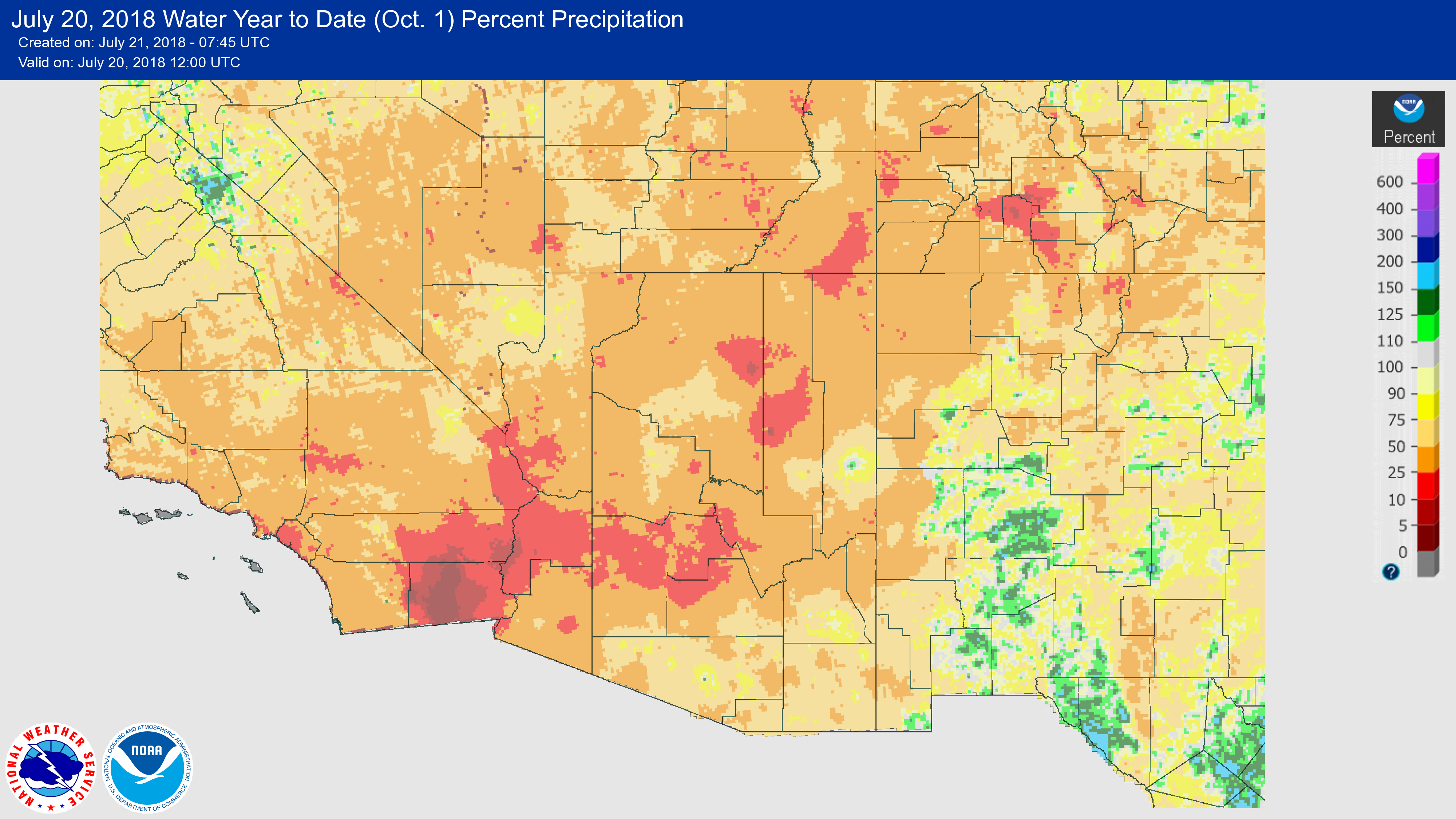 (Percent of normal precipitation since October 1st) 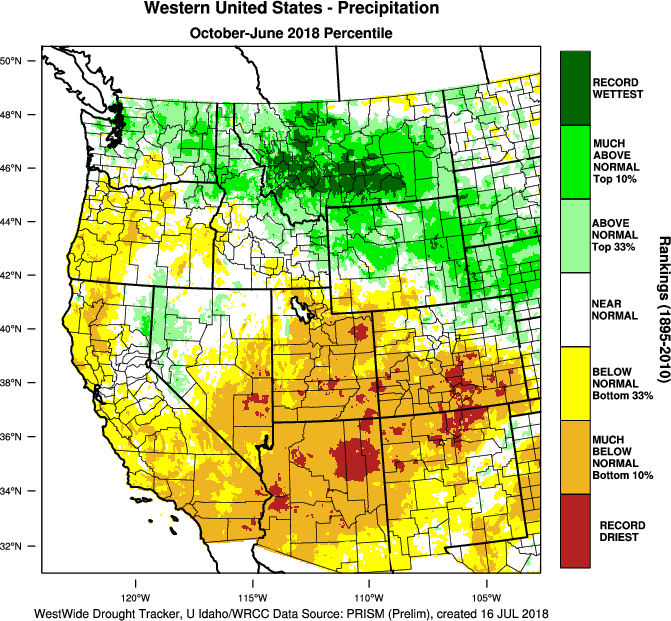 The drought conditions have been exacerbated by the fact that the majority of Arizona (and a good deal of the entire Southwest) is experiencing its warmest Water Year (Oct 1st-June 30th) in recorded history (since 1895). 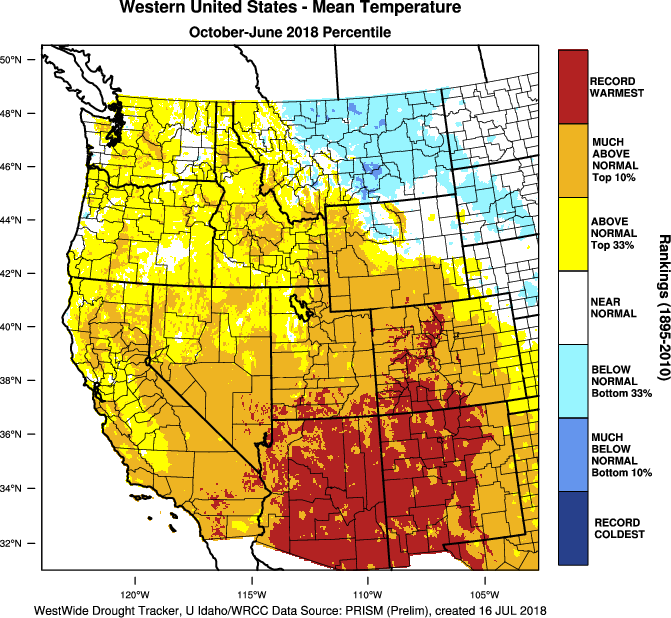 | The U.S. Drought Monitor is a weekly collaborative effort between a number of federal agencies including NOAA/NWS, U.S. Department of Agriculture and the National Drought Mitigation Center. Details and explanations of the Drought Monitor can found at the web site: http://droughtmonitor.unl.edu/ The categories of drought are defined as follows: Abnormally Dry (D0) - Going into drought: short-term dryness slowing planting, growth of crops or pastures; fire risk above average. Coming out of drought: some lingering water deficits; pastures or crops not fully recovered. Moderate Drought (D1) - Some damage to crops, pastures; fire risk high; streams, reservoirs, or wells low, some water shortages developing or imminent, voluntary water use restrictions requested. Severe Drought (D2) - Crop or pasture losses likely; fire risk very high; water shortages common; water restrictions imposed. Extreme Drought (D3) - Major crop/pasture losses; extreme fire danger; widespread water shortages or restrictions. Exceptional Drought (D4) - Exceptional and widespread crop/pasture losses; exceptional fire risk; shortages of water in reservoirs, streams, and wells, creating water emergencies. |
Precipitation/Temperature Outlooks:
The 8-14 day temperature outlook for July 28-Aug 3 period calls for much better chances of above average temperatures and a very slight chance of above average rainfall. The 30 day outlook for August 2018 (not shown) indicates only a modest chance for above average temperatures and above average precipitation. The 90 day outlook for the period August through October 2018 indicates better chances for above average temperatures and enhanced odds of above average precipitation.

__________________________________________________________________________
_________________________________________________________________________________
Reservoir levels remain well below levels at the same time last year, and similar to levels in 2016. Runoff has been near record low levels and additional reservoir re-charge will be minimal this year as monsoon season rains typical only offer limited benefits. | Reservoir |
7/20/2018
|
7/20/2017
|
7/20/2016
|
| Roosevelt |
45
|
65
|
42
|
| Horse Mesa |
92
|
92
|
95
|
| Mormon Flat |
95
|
95
|
95
|
| Steward Mtn |
93
|
92
|
94
|
Total Salt
|
54
|
70
|
52
|
| Horseshoe |
1
|
1
|
4
|
| Bartlett |
43
|
95
|
66
|
Total Verde
|
27
|
60
|
42
|
| Total System |
50
| 69 |
51
|

